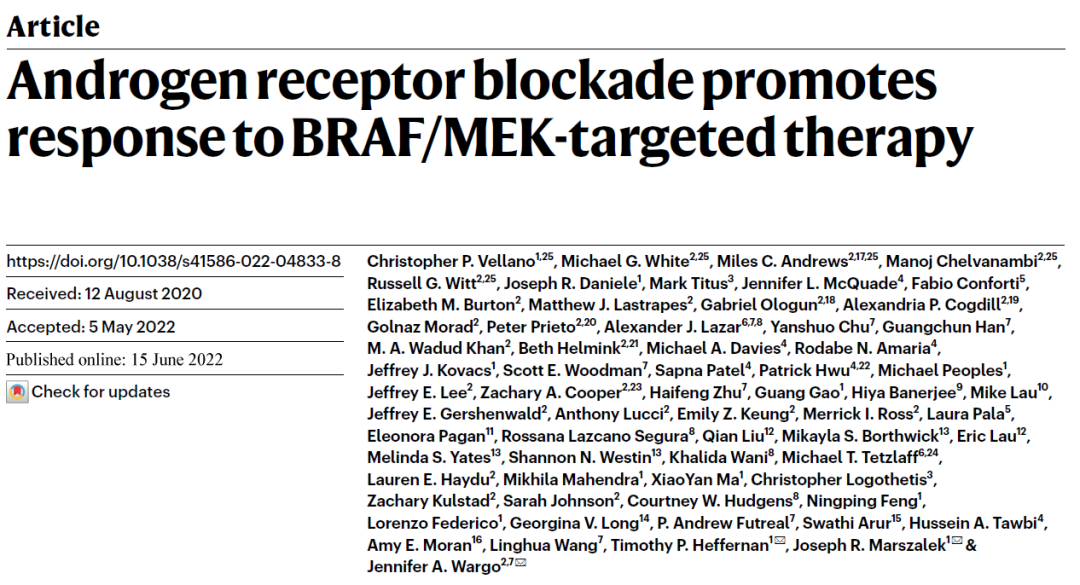Arogen receptor blocking can promote melanoma BRAF/Mek targeted therapy effect
Author:Bioart biological art Time:2022.07.04

Written article | Xueyue
Responsible editor | Xi
#Melanoma#
Treatment of BRAF and MEK has improved the treatment of melanoma and other tumors. However, the treatment strategies for treatment of drug resistance are still very common, and it is urgent to innovate. At present, there are many studies that men are related to the prognosis of melanoma patients, which also include Phase III and stage IV patients receiving BRAF targeted therapy. However, the mechanism is unclear. In the classic hormone reactive tumor, such as prostate cancer, the interaction betweenrogen receptor signals and MAPK and other signal pathways are well known. But these have fewer studies in black tumors and other cancers.

On June 15, 2022, the Jennifer A. Wargo team from the MD Anderson Cancer Center at the University of Texas published an article entitled Androgen Receptor Blockade Promotes Response to Braf/Mek-Targeted TheRapy. In -targeted therapy ,rogen receptor expression has increased significantly among male patients and is related to treatment resistance.

The author first studied a group of patients with local metastatic melanoma who received 8-12 weeks of new assisted Braf/MEK targeted therapy. Analysis found that men's response to treatment compared with female patients (66%and 14%, respectively). Moreover, the non -recurring period of the newly -assisted BRAF/MEK targeted treatment is significantly higher than male patients among female patients. Among female patients, whether the patient has menopausal has nothing to do with whether the treatment is reactive. This shows that estrogen has no main effect in the treatment of estrogen. The author next detects the expression ofrogen receptor in tumor receptors before and after receiving BRAF/MEK targeted therapy. The author found that the male patients in female patients have not changed significantly. Among male patients, the level ofrogen levels of patients with non -response patients have increased significantly and significantly higher than patients who have reactive treatment. However, in patients before treatment, the level ofrogen expression is not significantly different in patients with response and non -reactivity. This shows that the baseline level ofrogens cannot predict the treatment of drug resistance.
Next, the author uses animal models to verify these discoveries. The authors first verify that this phenotyan is indeed in the mouse with a healthy immune function, and the mechanism behind this table type is related to the BRAF/Mek targeted therapy. Next, Mouse CD-1 nude mice with low immune function also verified this phenomenon. This shows that this phenomenon is not mediated by the immune system. The author uses CRISPR to make therogen receptor knockout melanoma cell line, implant the body, and use Braf/Mek to target it. Compared with the control group, the tumor control of the male and female mice is valid and comparable. This shows that the expression ofrogen receptor is helpful to resist BRAF/Mek targeted therapy. It is worth noting that the baseline of therogens and the level of expression at the time of treatment. The male mice are significantly higher than that of female mice, which may be related to high -level testosterone among male mice. But the testosterone of plasma has not changed significantly. This shows that the poles in tumor cells drive the reaction difference between the BRAF/MEK targeted therapy. And high -expression ofrogen receptor can promote the proliferation of melanoma cells. The author finds that if mice are treated, they can significantly increase their response to BRAF/Mek targeted therapy. But this benefit disappeared after testosterone administration.
The data obtained in this study is of great significance to clinical treatment. This article shows that the resistance to the main treatment of the BRAF/MEK targeted therapy is related to the increase in the expression of therogens receptor. In the future, the mechanism behind further exploration is needed to regulate therogen receptor signals more targeted.
Original link:
https://doi.org/10.1038/s41586-022-04833-8


Want to know more exciting content, come and pay attention to BIOART biological art
- END -
Xinhua Full Media+丨 The State Council joint prevention joint control mechanism: Strict measures to strictly implement measures that are inconsistent with the inconsistency of the new crown pneumonia prevention and control programs.Clearance

Press conference on the press conference of the State Council. Xinhua News Agency ...
After the college entrance examination, "picking mirrors", doctors reminded: myopia surgery is not everyone can do

Jimu Journalist Liao ShiqiCorrespondent Ao PanpanWith the end of the 2022 college ...